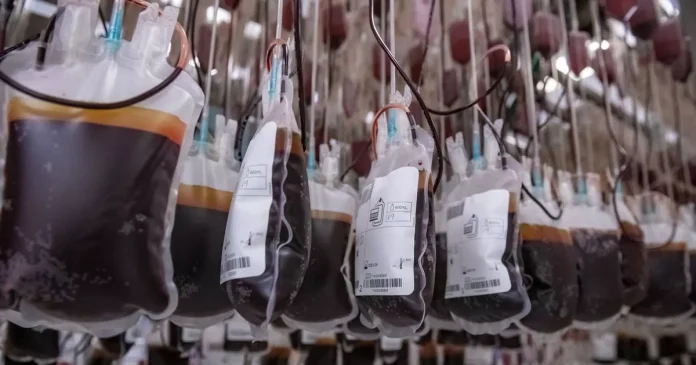Lab-grown blood could mean Britain no longer needs to rely on donations and could end shortages.
The Government’s chief scientific adviser has said unlimited blood grown from stem cells could soon be stored in huge factories around the country. Dame Angela McClean has released a report showing areas of engineering biology where Britain is pioneering new technologies, including creating compatible synthetic blood.
Professor McClean said: “The promise here is an unlimited supply of blood, so that we no longer have to rely on blood donations, which of course are a wonderful act on the part of the donors but do come with some of their own problems.”
The NHS remains on Amber Alert for low donation stocks. One donation can save up to three lives. The Mirror launched the Give a Pint, Save a Life campaign to help blood stocks recover after the Covid-19 pandemic amid ongoing shortages.
The announcement, reported in the Telegraph, comes after red blood cells grown in a lab from stem cells were transferred to a patient in a world-first clinical trial in 2022 led by NHS Blood and Transplant (NHSBT) and the University of Bristol. Results of the trial are due next year but if successful the Government report suggests vast amounts could be made and stored in factories so that no patient needs to die due to lack of compatible blood after accidents or surgery.
Dame Angela said unlimited blood supply was “the next thing to look forward to”, adding: “At the moment all blood that’s used after accidents and during surgery is from donations and it would be much better if we had other sources, because sometimes we run out, sometimes matching is very difficult, it’s difficult to store, difficult to distribute.
“We have quite a big consortium of people working in Bristol and they’re exploring the possibility of banking unlimited supplies of red blood cells. They do that by transforming stem cells or genetically reprogramming donated precursor blood cells.”
Stem cells are a special type of cells that are able to make more cells like themselves as well as become other cells that do different things. It is also now possible to take developing blood cells from donors, and genetically reprogram them so that they keep growing and dividing forever.
NHSBT, which is headquartered in Filton, Bristol, is running the Restore trial which has seen participants get two transfusions four months apart, one of standard donated red cells and one of lab-grown red cells. Researchers are also looking into creating “universal” synthetic blood cells which could be used for all blood types.
Lord Patrick Vallance, the science minister, said: “This is a timely report. Engineering biology is a technology with enormous potential, and it is already delivering innovations from healthcare to clean energy.”
The breakthrough in synthetic blood could transform the lives of people living with agonising sickle cell disease. It is the fastest growing genetic condition in the UK where red blood cells are sickle shaped rather than circular. This leads to agonising blockages that damage organs and can lead to blindness or a fatal stroke.
These sickle cell ‘crises’ are so painful that more severely affected patients can be prescribed morphine – more typically given during end of life care – just to get them through the day.
Sickle cell disease mainly afflicts people with Afro-Caribbean heritage and to survive they need to undergo regular blood transfusions to switch out faulty blood cells.
The Mirror has reported on shortages of ethnically matched blood donors as part of our Give a Pint, Save a Life campaign. In England alone there are around 15,000 people living with sickle cell disease with 250 new cases a year.
NHS data shows there were 32,000 hospital admissions in England in 202324 for sickle cell disorders and 14,000 were admissions for sickle cell anaemia crises.
To give blood, book an appointment by visiting www.blood.co.uk, use the GiveBlood app or call 0300 123 23 23.
At Reach and across our entities we and our partners use information collected through cookies and other identifiers from your device to improve experience on our site, analyse how it is used and to show personalised advertising. You can opt out of the sale or sharing of your data, at any time clicking the “Do Not Sell or Share my Data” button at the bottom of the webpage. Please note that your preferences are browser specific. Use of our website and any of our services represents your acceptance of the use of cookies and consent to the practices described in our Privacy Notice and Cookie Notice.





